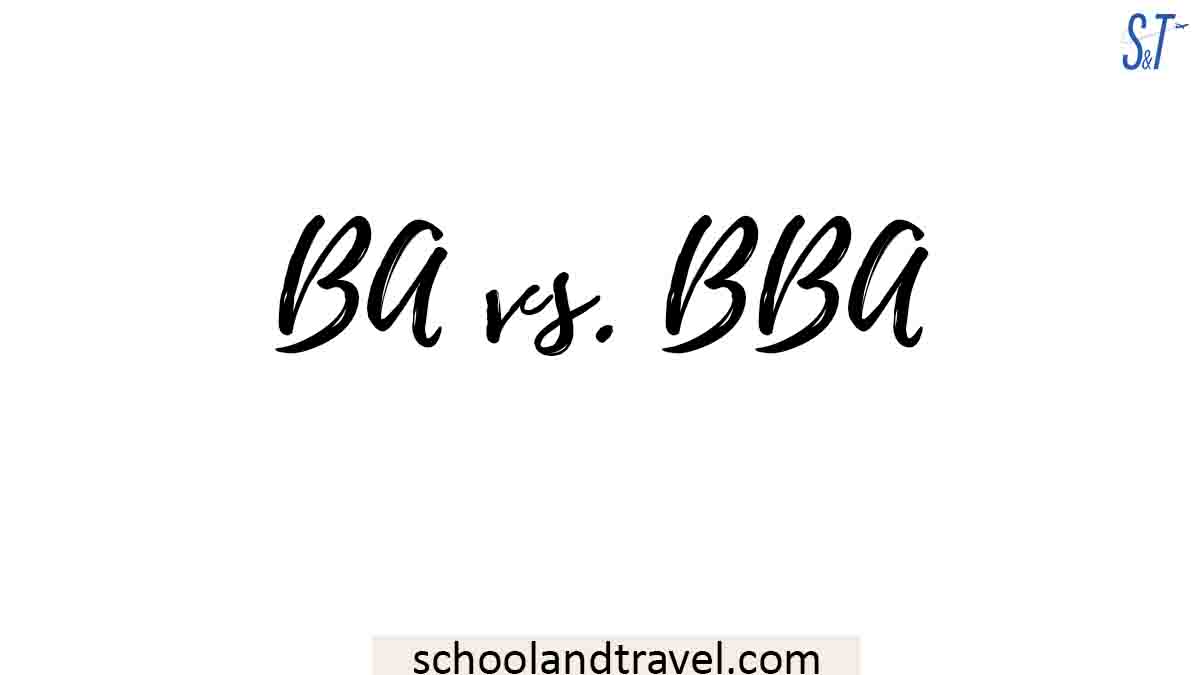BA vs. BBA: Students, commonly from the commerce area, are frequently stuck on comparing “BA vs. BBA” degrees after completing high school and which would fit their career dreams and aspirations.
Although many believe “BA and BBA” to be similar, they happen to be very distinctive undergraduate degrees.
One can be classified under the Arts and Humanities classes online programs, while the second lies in the business program
These two degrees display a few distinctions among themselves in the courses offered, their required qualifications, and conditions for eligibility.
In this article, we’ll take a detailed look at “BA vs. BBA” degrees and how they differentiate from each other.
BA vs. BBA: Overview
Bachelor of Arts (BA)
Bachelor of Arts is a six semesters program offered by undergraduate students. This program is considered one of the educational sector’s diverse programs with specialization in fields such as humanities, arts, and social sciences.
With that known, BA is widely attributed to being one of the most famous degree programs amongst tertiary institutions globally.
Aside from those in science classes, programs offered in BA are usually of great fit among students who just graduated from high school.
This is made possible as a result of how flexible the program curriculums are. Generally, college students offering BA need to choose a major, which defines the specialization, and in hand with the major they chose, they need to pick out some elective courses.
Bachelor of Business Administration (BBA)
A Bachelor of Arts is a fantastic choice of an undergraduate program for any individual who desires to set up as an entrepreneur or seek jobs in managerial positions.
BBA, just like BA, is likewise a six-semester undergraduate program, but rather, it deals with how businesses are administered and managed.
BBA college students are taught the important principles and subjects concerned with how businesses grow and function. Some of these important principles are personnel management, brand management, marketing, and so on.
What is a BSBA degree?
BSBA is the short form for Bachelor of Science in Business Administration. It teaches college students the way to use mathematics and analytics to carry out business with much ease.
Students can also study managerial theories, principles, and applications and how to apply their acquired skills and knowledge in the business world.
What differentiates BBA from BSBA?
A Bachelor of Business Administration tends to encompass special business programs, whereas a bachelor of science in business administration normally has popular educational necessities and various distinct curricula.
Naturally, business courses are nonetheless the primary focus of both programs.
Read this: Is a DBA degree worth it? (Quick answer)
BA vs. BBA: Specialization
“BA” and “BBA” are open to college students of all programs. They are the favoured preference, of course, commonly for commerce and art students.
“BA” and “BBA” offer a huge range of flexibility to the students according to the specific course they wish to study.
BA Specializations
Choosing a program for pursuing a Bachelor of Arts degree has to rely upon your interest.
Bachelor of Arts gives several specializations within social sciences, literature, arts, and lots more. A few of the most popular BA specializations are as follows:
- Archaeology
- Education
- Anthropology
- Sociology
- History
- French
- Geography
- Culinary Arts
- German
- Economics
- Public Administration
- English
- Astrology
- Hindi
- Ancient History
- Literature
- Journalism
- Library Science
- Psychology
- Mathematics
- Rural Development
- Political Science
- Graphic Design
- Philosophy
- Visual Communication
BBA Specializations
Depending upon an individual’s choice, individuals would be able to offer some of BBA specializations other than the General courses.
Being a professional program, BBA targets a specific section and is supposed to offer students the essential base and competencies for success in their profession.
BBA is more of an expert program than an ordinary Bachelors’s program because it specializes in a specific professional field.
Here are a few BBA specializations:
- Business Laws
- Principles of Management
- Marketing Management
- Event Management
- Business Mathematics and Statistics
- Foreign Trade
- Business Data Processing
- Business Economics
- Airport Management
- Financial and Management Accounting
- Tourism Management
- Production and Material Management
- Hospital Management
- Personnel Management and Industrial Relations
BA vs. BBA: Benefits
Picking to pursue a career in any of “BA” or “BBA” has its advantages. One has to pick the programs primarily based on what they want because it allows college students to develop capabilities based on their requirements.
Some Benefits of BBA
BBA will show prospective employers individuals that will apprehend the essential concepts of beginning and developing a business.
In addition, selecting a BBA specializing in the area of interest signifies dedication, ambition, and commitment, all exceptionally valued in relatively competitive job markets.
BBA can even train the entirety that one wishes to understand, turning huge ideas into huge dreams. As a result, many graduates of BBA go after a specialized Master of Business Administration degree (MBA).
Read this: What does FAFSA stand for? (Quick tips and info)
Some Benefits of BA
To start with, BA is an extraordinary manner to stand out to future employers. It is important for a lot of jobs. A Bachelor’s degree is needed for almost 60% of all jobs and higher process possibilities usually mean better incomes capability.
Studying BA for 3 or 4 years will assist one in broadening the capabilities required to prevail in the current marketplace.
It will assist college students in discovering ways to assume severe approximate issues while searching out modern new methods to antique approaches of doing things.
BA vs. BBA: Job Opportunities
Students choose to select their courses primarily based totally on their experience in careers in the identical area. Since graduates have experience in diverse courses, they would pursue careers in a whole lot of fields.
The capabilities related to the BA or BBA programs are diverse, and their payment system is ever-changing.
Bachelor of Arts Jobs Opportunities:
- Human Resources Manager
- Operations Manager
- Marketing Manager
- Executive Assistant
- Business Development Manager
- Operations Team Leader
Bachelor of Business Administration Job Opportunities:
- Corporate Finance
- Asset Management
- Investment Banking
- Banking
- Trading
- Fund Management
BA vs. BBA: Which to go for
“BBA” and “BA” are very good options to consider when picking a career; however, which one you pick out must be primarily based on your expert choices and long-time ambitions.
Career:
If an individual aspires to be in a management discipline, he or she will choose BBA; otherwise, BA can provide academic and career opportunities in research.
BBA is a greater management routine program, while BA is a generalized program with tremendous alternatives to pick out from.
Opportunities:
BA has greater possibilities than BBA because it gives numerous professional opportunities to graduates. BBA is precise to company jobs associated with management, whereas you could transfer from one discipline to any other in BA.
Frequently Asked Questions on BA vs. BBA:
BBA is a more management-focused course, whereas BA is a more broad course with a plethora of alternatives.
A bachelor’s degree in English, political science, history, linguistics, psychology, social work, economics, or archaeology qualifies you for a variety of relevant employment in the private and public sectors.
A BA graduate will be able to pursue a variety of higher education opportunities in a variety of professions, including management, and law, journalism.
Yes, MBA programs are available to students who have completed their undergraduate studies in the arts, commerce, or sciences. To be eligible to enroll for various MBA admission tests, you must achieve at least 50%.
BA vs. BBA
Conclusion:
We will say that these may be a potential professional choice; however, pursuing them ought to depend upon your professional pursuits and career goals.
Moreover, reaching a successful profession relies extra on hard work and perseverance instead of your discipline of study.
Awesome one; I hope this article answered your question.
Share this Information.
Related
Editor’s Recommendations:
- 15+ Cheap Hobbies for College Students
- How To Make Money With Your Smartphone In South Africa
- 9+ Best Investment Opportunities In Nigeria |Updated
- How do Radio Stations Make Money? (Step by Step, Promotion)
- How to Get Paid to Watch Hallmark Movies ($1000)
- Top 10 Best Colleges in Jacksonville





